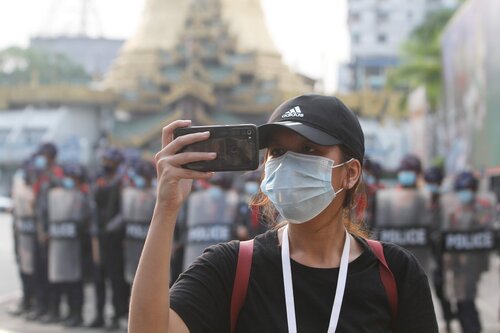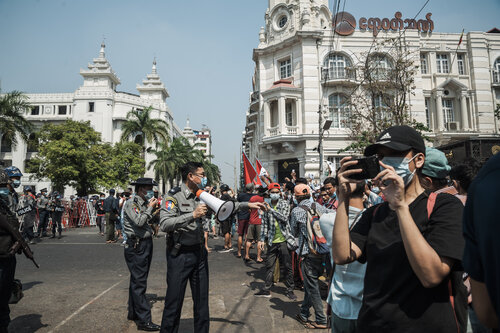Interview with Naw Betty Han


By The Coalition For Women In Journalism
Katarzyna Mierzejewska: Myanmar’s military leaders are deploying forces, both armed and digital, to stifle news coverage and attack journalists. This includes citizen journalists who want to broadcast the live events to inform the international community of the human rights violations in Myanmar. Could you tell us more about the current environment for journalists?
Naw Betty Han, Frontier Myanmar: The situation in Myanmar is far from being under control, especially in Yangon. The military decided to shut down five major media organizations, including Myanmar Now. They are blocking mobile internet. It’s daunting, but we all try hard to tackle these censorship tactics and connect with the world against the odds. Many journalists work from shadows, moving from one safety house to another. The reprehensible crusade against journalists resulted in significant declines in the number of active reporters working in the field. We are understaffed and short in resources. Those who carry on with their reporting are being relentlessly chased by the police. Police and military tirelessly try to find them and eventually arrest them. According to the data we gathered, 44 journalists were detained since the coup hit the country. Let’s face it— we are afraid. Covering the events unfolding on the ground is extremely challenging. The tenacity among the protestors is not wearing off, which instigates police violence. Violence is now becoming a pattern. Soldiers and officers clash with the people and use live ammunition on a daily basis. If they spot a journalist in a crowd, they will surely try to impede them from reporting at any cost. That means physical attacks, detentions, or worse. I myself go to the streets and report on the ground. I use Twitter to disseminate the news and reach out to more people and always watch my back. The unpleasant sensation of being a target always stays with me. I feel very concerned about my safety. I know the danger is real and I can be abducted or arrested any minute. Even if I try to stay out of their sight.
How did your work change throughout this time?
There is a tendency to keep things low-key. We speak a lot about the potential shutdown of our media outlet. We know that we can be next in line. We already discussed some potential solutions which may enable us to continue our work. In the immediate aftermath of the military coup, we resigned from bylines. All of our articles are now presented as a joint collaboration of the whole Frontier Myanmar team. We are also very cautious about who we are sending to the protests. Since the military seized control of the government, many of my colleagues stay in safe locations and work remotely. Only a few of us take up assignments on the ground. We try to reduce potential risk. I don’t wear a badge or press credentials. I cover my face and aim to stay unnoticed. I speak to people out of the big crowds and record the events with my phone secretly. As long as I am not recognized, I can do my job. At least to some extent. But nobody knows how long it will last. It’s better if they take me for an anonymous protester or a pedestrian just walking the streets. Once I gather the material I need, I quickly come back home. I don’t hang out outside more than it’s necessary.
Were you or any of your colleagues attacked while on duty?
A photojournalist from our team was hit in his head with a rubber bullet. He needed some short time to recover, but luckily, all is fine now. I was hit with a rubber bullet myself. On February 28, when I was covering a demonstration in Yangon, the police officers started pressing on us, attempting to surround us, and we found ourselves trapped. I escaped together with several civilians and other journalists, and we hid in an apartment in a block nearby. Officers chased us there, and once they saw me recording the whole situation, they fired rubber bullets and shot me. I got injured.

As you mentioned, we have observed a rapid surge in police brutality. After weeks of defiant mass protests opposing the military coup, security forces are increasingly violent, using live ammunition to break up rallies. As a person in the eye of the storm, you have a unique perspective on how the events are unfolding. Tell us more about the current status of protests and what the socio-political landscape in Myanmar looks like right now.
The level of ferocity is excruciating, and it’s just getting worse. At the beginning, military forces didn’t attack people who were taking to the streets in thousands. Yet, since the end of February, police and military have increasingly used lethal violence in an attempt to crush demonstrations. The first person was killed on February 27. Peaceful protesters are being mercilessly attacked. Violent suppression of protests results in dozens of fatal victims (even 30) on a single day. Apart from physical abuse, the whole system of invigilation is expanding. Nobody can feel safe. Military stifles any remains of civil liberties and infiltrates society. They raid houses of teachers, doctors, anybody who – in their opinion – could support CDM (civil disobedience movement). Doctors, engineers, students— everybody can become a target. Recently, few people from medical staff were arrested at midnight. Military and police like to follow people into the narrow, less frequented streets and threaten them. Just to show their power and engrave the sense of permanent alert among the people. It also happens that armed officers vandalize shops in plain light or crush CCTV to make sure none of this would be recorded. The impunity is flagrant. My father, who lives in the countryside, was in a tea shop the other day and saw through the windows how few military officers were stealing his motorbike. Obviously, we will never get it back.
These are some main reasons why people seem to avoid big public gatherings in the center of big cities and tend to organize smaller protests in their townships. The danger of being assaulted or abducted is still there, but at least your chances of getting help in your neighborhood and finding a safe location for a night are higher. The way of protesting needed to be adjusted to the new reality as well. Instead of just spontaneously joining a crowd, people actually prepare for going to the demonstration. They create a sort of handmade safety tool kits such as goggles, hard hats, and shields for protection. Police use real bullets, water tanks, pepper spray, and batons. Civilians feel like they need to be ready for the worst. Just for their own sake.
Out of 44 journalists detained since the beginning of the military coup, 24 were already released. While one might take it as a positive note, we need to remember that these reporters shouldn’t have been apprehended in the first place. How many of them are women, and what do we know about their situation?
As for now, seven women journalists remain behind bars. They are all booked Section 505(a) of the Penal Code. It is a legal provision heavily used by the military to penalize critical speech. Journalists are detained for spreading fake and harmful news, while, in fact, they were solely doing their job and broadcasting protests. Shin Moe Myint, a 23-year-old freelance photojournalist, was severely beaten and arrested by seven policemen while she was covering the protest in Yangon. I watched a video that demonstrates how she was shoved and brutally attacked by the officers. It was harrowing, simply disparaging. Although Shin was released, there is no guarantee it won’t happen again. She is now in recovery. Apart from physical injuries, this harassment left deep scars on her mental health. It was a traumatic ordeal.
A journalist with Myanmar Now, Kay Zon Nway, was apprehended while covering the police clashing with the protesters. She remains in prison. She attends court hearings via video call, and by the same way, can communicate with her lawyer. Nobody can visit her. She was put in solitary. People kept in nearby cells told me they saw her a few times while she was taken to the medical aid. She had injuries and bruises on her face and some parts of her body. It is abundantly clear that she has been beaten and abused. If convicted, Kay may face up to three years in prison. Unfortunately, we don’t have much information about other women journalists who are being held in prison. They were placed in facilities across the country, in some remote areas. We have very limited access to these places, and the law enforcement obviously is not keen on being transparent.
We spoke about really distressing issues. It surely takes a toll on your health as well. How are you feeling?
I have a feeling I will be arrested soon. It’s clear that it will eventually happen, especially since I don’t cease to do my job. And I will not stop. We have been witnessing a revolution, and I want to remain on the rising front of these developments, report on blatant human rights violations and hopefully see the end of the military dictatorship soon. Journalism is much more than my job, it’s my mission. Therefore, I am willing to take the risk.
Original post: The Coalition For Women In Journalism

